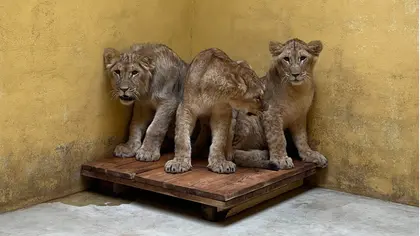Three-year-old lioness Aysa was pregnant when the private zoo where she was being kept, in the Donetsk region, had to be abandoned last year as Russian forces advanced.
She was rescued and taken to a sanctuary near Kyiv, where she gave birth to three cubs, Emi, Santa and Teddi ten months ago.
JOIN US ON TELEGRAM
Follow our coverage of the war on the @Kyivpost_official.
The evacuation from the war zone was made possible through a collaboration between several NGOs: the International Fund for Animal Welfare (IFAW), Wild Animal Rescue, UAnimals and Poznań Zoo.
In total, over a dozen big cats including lions, tigers and leopards were moved to safer locations outside of Ukraine.
Plans are now being drawn up to bring Aysa and her family to the Yorkshire Wildlife Park near Doncaster in the UK. The park has a history of rescuing animals from difficult conditions. In 2010 it brought 13 lions from a Romanian zoo that could no longer cope with them.
John Minion, chief executive of Yorkshire Wildlife Park, was quoted on the ITVX website as saying: “When [the lion enclosure] was built for the rescue of the 13 lions from Romania in 2010, it was built with the help of donations from people who loved animals and wanted to help rescue the animals.
“It was always meant to be a welfare facility and now we are in a position where we can offer a home to these poor lions and hope that we can make a difference to their lives, just as we did for the Romanian lions in 2010,” Minion said.

‘We Need to End That Horrible, Horrible War’ – Ukraine at War Update for Dec. 23
The park, which is home to more than 400 animals, is now working with the UK and Polish authorities to finalize the required paperwork and arrange for the transfer of the animals.
The majority of big cats bred in captivity cannot be released back to the wild and space in high-quality care facilities is limited. The Poznań Zoo and its partners work to identify suitable homes in or outside of Europe for rescued large animals where they will receive lifelong care.
“It’s a scary time for everyone here in Ukraine. And these big cats are not only another victim of the Russian invasion, but also suffered from human exploitation. Although there are many more animals that need rescuing — I am relieved these lions now have a better life ahead,” Natalia Popova, from the Wild Animal Rescue NGO, said.
You can also highlight the text and press Ctrl + Enter






